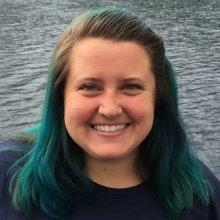
Alexis Weinnig
Tell us about your work/research. What kinds of things do you do?
I am a deep-sea ecologist who specializes in deep-sea corals. Much of my research focuses around trying to understand how humans are impacting deep-sea ecosystems, especially deep-sea coral communities. This involves, first exploring areas to develop a better understanding of who (corals and associated animals?) live in the area, as well as, categorizing the environmental and oceanographic conditions (depth, temperature, pH, oxygen, etc.). I also run live coral experiments in our laboratory at Temple to try and understand how deep-sea corals respond to different stressors, from climate change-related factors to more direct stressors such as oil and dispersants.
What sparked your initial interest in your career?
I was always intrigued and drawn to the oceans from a young age. I pursued a degree in biological oceanography because I was interested in how the ocean influences the life within it and vise versa. Learning about deep-sea ecosystems during my undergrad really sparked my interest and once I learned about how amazing and diverse deep-sea corals were, there was no going back!
Who influenced you or encouraged you the most?
I had a teacher early on in my elementary education who was passionate about the oceans and nature which really influenced me from a young age. My parents then fostered that interest as I grew up and encouraged me to pursue a degree in oceanography. As I have moved through higher education, I find a lot of encouragement in my peers - watching my friends and colleagues pursue their passions alongside my own is really motivating (even on the hard days)!
What element of your work/study do you think is the most fascinating?
Honestly, I am constantly in awe of the fact that we have the opportunity to do exploration in it's purest form. It is truly humbling to take a step back and realize you are the first people to ever see that part of the seafloor and the life there.
What other jobs led you to your current career?
I have had a number of jobs that have led me to my current job as a deep-sea ecologist. One job that really improved my ability to talk about my research to the general public was working as a Teacher and Youth Education Assistant in the Education Department of the California Academy of Sciences. In this job I worked alongside educators to develop and deliver informal science education curriculum - the skills I gained through that position are ones I would never have had the opportunity to develop in a strictly 'science job'.
What are your degrees and certifications?
Bachelors of Science in Oceanography - Florida Institute of Technology, 2012; Masters of Science in Ecology, Evolution, and Conservation Biology - San Francisco State University & The California Academy of Sciences, 2015; Doctor of Philosophy in Biology - Temple University, ongoing
What are your hobbies?
When I am not sciencing I enjoy hanging and going on hikes with my awesome dog, Ella (she has moved across the US with me TWICE!). I also really enjoy hosting small get-togethers of good friends with games and yummy food - nothing feels as good as bringing joy to the people around you.
How did you get involved with the Nautilus Exploration Program?
My PhD advisor (Erik Cordes) and lab mate (Steve Auscavitch) has been involved with the Nautilus for a number of years and I have been on previous cruises to this area of the Pacific so they thought I would be a good fit! I have participated as an on-shore scientist in the past but I'm very excited for a chance to sail on the Nautilus.
What advice would you give someone who wants to have a career like yours?
The advice I feel equipped to give anyone looking to pursue a career in marine science and ocean exploration is to keep an open mind and always be looking to the future. Even if what you are currently doing isn't exactly what you wish to be doing longterm, use the experience you are gaining now to build a skill set for your "dream job". Anyone can learn the techniques it takes to study different facets of marine science but often the most valued scientists are valued for their skills outside science, such as, compassion, leadership, teamwork, and organization - which everyone can always work on developing!
Expeditions
Alexis participated in the following Ocean Exploration Trust expeditions:
